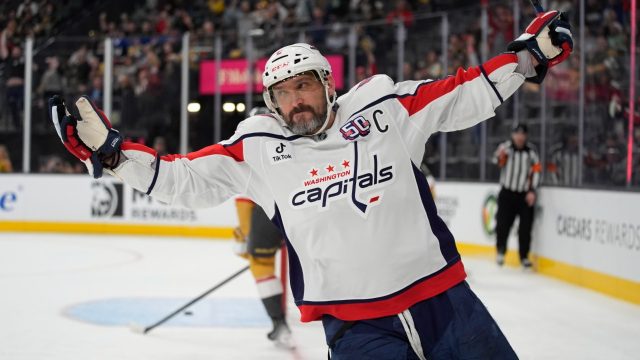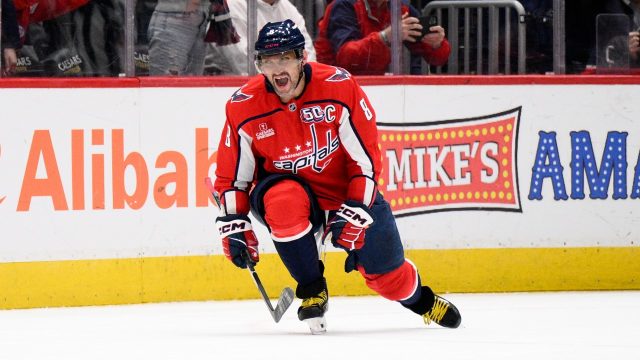
Having assisted 279 of Alex Ovechkin’s goals, Washington Capitals centreman Nicklas Backstrom was called in for a press conference in late March, as his long-time teammate chased history. Streaming live via video call to media around the globe, Backstrom discussed a bunch of things, including the role he played in getting Ovechkin to the brink of the NHL’s all-time goal-scoring record.
Backstrom took no credit, saying Ovechkin deserved it all, and the Swede also pointed out that chemistry with the Russian superstar had been easy to find.
“I honestly think that the first time when we started playing with each other, I just think that we were a good match,” Backstrom said.
The numbers sure back that up: Ovechkin is three goals away from breaking Wayne Gretzky’s all-time mark, and of the 892 he’s scored in the regular season, Backstrom chipped in on more than 30 per cent, despite not having played since 2023 due to a hip injury.
As well-suited as Ovechkin and Backstrom are on the ice, though, a few years ago, they decided one big topic was off-limits off the ice. Not long after Russia invaded Ukraine, Backstrom lamented the number of lives lost due to the war in an interview with Expressen’s Magnus Nystrom. He also told the Swedish national newspaper, “Me and Ovi have decided that in our relationship we do not talk about politics, and what is happening in Ukraine at all.”
Backstrom added: “It’s the same in the dressing room. Nobody talks about that.”
Ovechkin has made his support of Russian president Vladimir Putin clear and public. He wrote on Instagram back in 2017 that he’s “always supported him openly,” and the pair are pictured together in Ovechkin’s profile photo. When asked, Ovechkin has told media that the war needs to stop, but he hasn’t gone on record saying he disagrees with Russia’s invasion of Ukraine, sticking instead to the message that he’s an athlete, not a politician.
So, can we focus on the physical accomplishments of an athlete alone, without the context of who that athlete is, and what they believe, off the ice?
Like Backstrom choosing to keep politics out of his relationship with his teammate, hockey fans are faced with a decision as Ovechkin closes in on Gretzky: how to balance the celebratory aspects of the winger’s historic achievement against the accompanying political backdrop. This includes not just Ovechkin’s continued support of a dictator at the helm of an illegal war resulting in what UN High Commissioner for Human Rights Volker Turk describes as “large-scale human rights violations,” but also Gretzky’s support of American president Donald Trump, who has said he wants to make Canada the “51st state.”
Even the NHL itself can’t escape the conflict: The league has branded Ovechkin’s quest a celebratory ‘Gr8 Chase,’ yet it chose not to invite Russia to the 4 Nations Face-Off, the biggest international event it’s hosted in years.
“Considering the current political situation with Canada and the United States, and Russia, it’s all just beyond hockey, I think,” said Daniel Rubenson, a political science professor at Toronto Metropolitan University. “I don’t think it’s possible to separate these things.”
Rubenson and NYU professor Christopher Dawes recently published a study looking at nearly half a million soccer fans to determine how support for an athlete changes depending on whether a fan is focused on the player’s club affiliation or nationality.
“What our study shows is that even among sports fans who are super knowledgeable … their evaluations of a player can be affected by what is top of mind for them in terms of his identity,” Rubenson explained, noting Capitals fans might view Ovechkin more favourably in a situation where his Capitals allegiance, rather than the fact he’s Russian, is front of mind.
“When Ovechkin comes out and, maybe, is not critical of Putin or is supportive of Russian politics and so on, that probably creates a real dissonance for some fans,” Rubenson added. “In the same way that Wayne Gretzky currently might be a slightly polarizing figure in Canadian politics.”
The Great One is a known Trump supporter and also sparked controversy before the 4 Nations Face-Off final between Canada and the U.S. when he gave a thumbs up to the American team. A statue of Gretzky outside Rogers Place in Edmonton was recently vandalized, smeared with feces.
Rubenson, whose specialties include the intersection of sport and social identity, believes Gretzky’s recent behaviour has altered the debate around the record, and the value some Canadians ascribe to it. “I think some sports fans will feel betrayed, because Wayne Gretzky has been so wrapped up in Canadian national identity and the way Canadians, sort of, view themselves,” he said. “Having this record fall is a bit of a blow to some people’s sense of national identity, because hockey is really wrapped up in Canada’s national identity. Then, at the same time, Gretzky is, for some people, this problematic figure who is turning his back on Canada and Canadian identity. And certainly, in the current situation with regard to the United States, it’s difficult for some people.”
For Bruce Kidd, ombudsperson and professor emeritus at the University of Toronto, the view of Gretzky has been complicated for quite some time. Kidd, a former distance runner who represented Canada at the 1964 Olympics, recalls shedding tears when Gretzky was traded from Edmonton to the L.A. Kings in 1988. His opinion of The Great One changed significantly a couple of years ago, though, after Gretzky appeared in advertisements for sports gambling.
“He effectively emigrated to the United States and, although nobody can forget his extraordinary ability and the wonderful memories he gave us, I think he wore out his welcome,” said Kidd, 81, who was awarded the Order of Canada for his lifelong work promoting human rights in sport, and is now involved in a campaign to ban sports gambling ads. “My sense is a ton of people lost respect for Gretzky when he became a shill for sports betting,” he continued. “So, what happened in Boston [with the thumbs up for Team USA], I mean, that was several steps down the road of him losing his aura.”
Still, Kidd strongly believes sport can be separated from whatever narratives might surround it.
“I’m a believer that sport is a cultural form that brings people together across many, many differences,” he said, noting his approach to Ovechkin is no different. “I hold many ideas simultaneously: I admire him as an athlete. I hate the fact that he’s an advocate for a war criminal. And I come from a culture that says we should still conduct sport with people on the other side as a way of lowering the temperature and developing cultural understanding, rather than leading people to break off communication entirely and go to war.
“Even though I have these very critical feelings about Ovechkin, I mean, he’s a joy to watch. He enriches the sport.”
Kidd feels the conflict in celebrating Ovechkin, but he points out that multiple narratives simultaneously occur in all sport. He gives the example of taking in a baseball game while also watching the atmosphere around the ballpark, taking in things like fan behaviour and the many advertisements.
“I’ve always watched sports with two or three eyes,” Kidd said. “I think the point is that we shouldn’t insist on one at the expense of all the others.”
There’s no debating that there are many narratives surrounding Ovechkin’s pursuit of Gretzky’s record, that the question of how to take in what will be an historic moment in the sport is a complicated one. In the end, it’s up to sports fans to determine what they’ll keep front of mind.
“Recognizing that politics and sports are completely intertwined doesn’t mean that you lose sight of those moments in sport when you forget about everything else, because the drama is so exciting, or the skills are,” Kidd said. “But you don’t park your brains either, that’s the thing.
“It’s hard. It’s really hard.”






